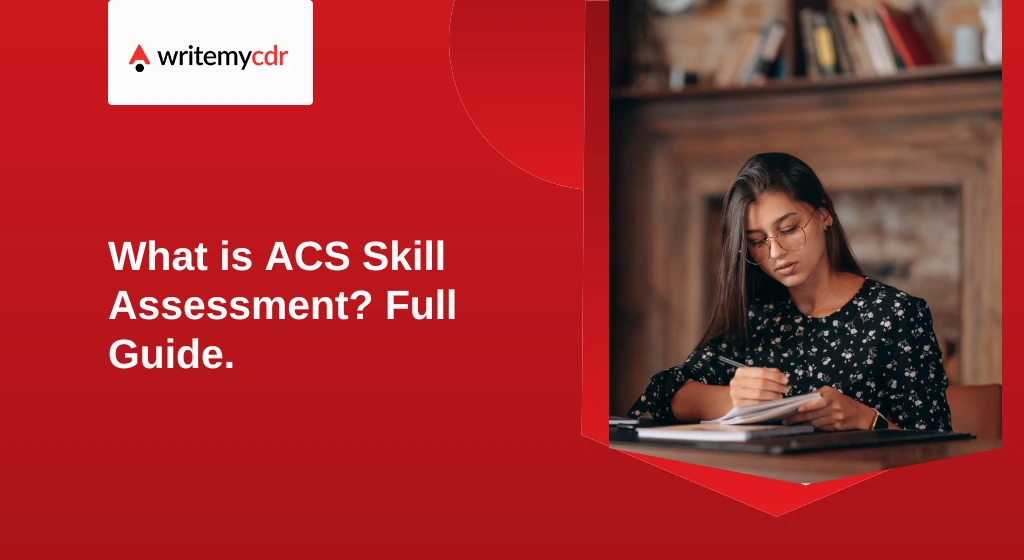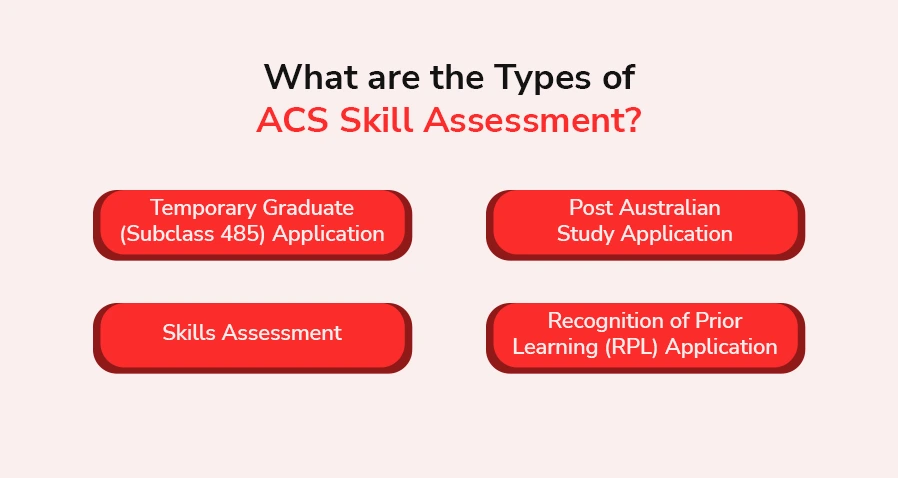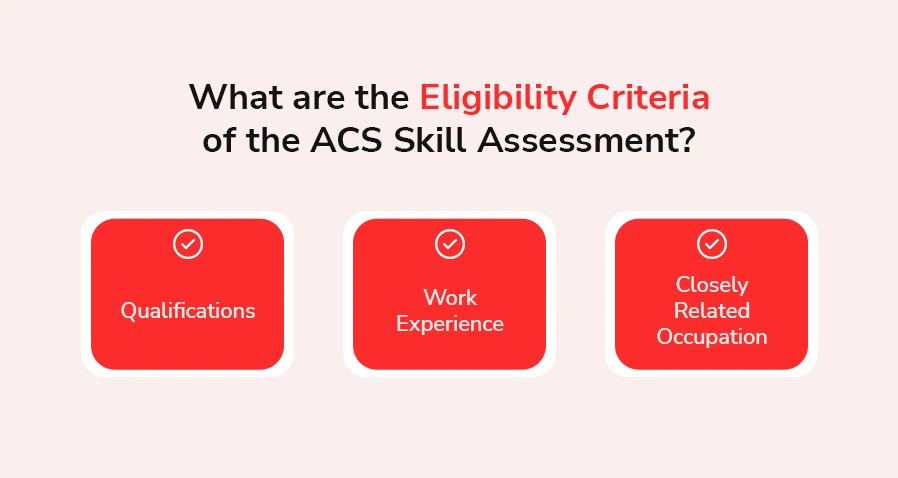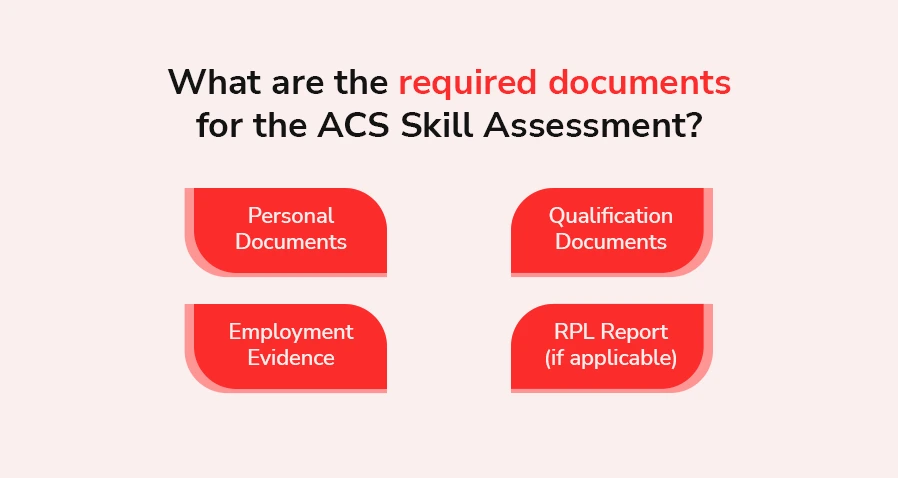
The country’s vibrant IT industry, high remuneration, and quality of life make Australia an attractive destination for IT professionals. The ACS Skill Assessment, provided by the Australian Computer Society (ACS), is an essential step for foreigners studying computer science who intend to relocate.
This assessment, while rigorous, ensures that your skills and previous experience align with the standards of the Australian IT industry, thereby enhancing your chances of a successful migration.
Here, you will find all critical details regarding the ACS Skill Assessment, from understanding the eligibility criteria to preparing your documents, applying, and gaining expert advice on Excel.
What is the ACS Skill Assessment?
ACS Skill Assessment is, therefore, a compulsory process for IT migration, especially for those who fall under Australia’s General Skilled Migration Programme. The ACS is, to our knowledge, the official evaluator for the IT industry. It determines whether an applicant has the AQF-accredited qualifications and experience to qualify for recognised job roles as explained under ANZSCO.
What are the Types of ACS Skill Assessment?

The types of ACS Skill Assessment are as follows:
1. Temporary Graduate (Subclass 485) Application
The Temporary Graduate (485) application is targeted at international university students who have not recently finished an ICT course in an Australian study environment. Graduates who may want to apply for a Temporary Graduate visa (subclass 485) often select this route.
Among its advantages is that it does not require employment history, which makes it perfect for graduates who have completed their studies. However, the selected degree should be very closely connected with the identified ICT occupation because the ACIT and ANZSCO codes determine it. This pathway will allow graduates to get temporary employment in Australia and form a platform for the entry of future permanent residency.
2. Post Australian Study Application
The Post-Australian Study is valid. It is targeted at international graduates with an ICT credential from an Australian institution who are keen on permanent migration. Unlike the 485 route, candidates are required to have one year of working experience after graduation or complete an ACS-accredited PY program to qualify.
Through this approach, it is confirmed that applicants have formal qualifications for Australia and practical ICT skills or industry preparation, which places them at an advantage in migration-related outcomes.
3. Skills Assessment
For ICT professionals from overseas with qualifications and working experience outside Australia, a skills assessment (general) is the dominant way to make an application. Applicants must demonstrate their qualifications, which consist of a significant or minor study in ICT and skilled work experience relating to the duties stipulated in the nominated ANZSCO occupation.
According to the ACS, are the applicant’s academic qualifications and practical experience adequate to meet the Australian competency benchmarks for the occupation? Applicants may need to accrue additional work experience to fulfil the requirements, especially when their qualifications do not fit well in ICT.
4. Recognition of Prior Learning (RPL) Application
The existence of an option, Recognition of Prior Learning (RPL), allows candidates to have in place a disposal of formal credentials in ICT or a lack of educational background that may not closely resemble their ICT experience. Using this actual route, individuals will be able to analyse their abilities to apply ICT according to the skills and knowledge that they have gained through their work experiences.
To move forward, applicants have to submit an RPL report that includes two project reports showing their practical encapsulation of ICT concepts and competencies. Applicants for this pathway will have more years of experience in ICT (from 6 to 8, depending on background) and are suitable candidates for those professionals who have perfected their expertise not through formal study but through on-the-job training.
What are the Eligibility Criteria of the ACS Skill Assessment?

The eligibility criteria of the ACS Skill Assessment are as follows:
a. Qualifications
The ACS’s evaluation process is thorough. It begins by assessing your academic qualifications, ensuring they meet the Australian standards for ICT occupations. Your degree will be categorised as an ICT major, ICT minor, or non-ICT qualification, based on its relevance to your nominated profession as outlined in ANZSCO guidelines.
If your qualification is an ICT minor, this means that it does not have much ICT content. Consequently, you will require additional years of work experience to attain the qualification criteria. If your qualification is outside the scope of ICT majors or is from a non-ICT field, you will have to apply via the RPL (Recognition of Prior Learning).
b. Work Experience
Work experience is an important aspect of the ACS skill assessment. It must be paid professional experience in a relevant occupation or potential role, and only full-time work (minimum 20 hours/week) is considered suitable. The ACS will only include work experience that took place after you reached the necessary age, and it should be relevant to the nominated occupation. Understanding the significance of work experience in the ACS assessment will help you prepare effectively.
Employment that ACS can consider must be full-time (at least 20 hours a week). Just as importantly, the ACS will overlook any work experience prior to when you satisfied the skill-level requirements for the nominated occupation. Take the case: if you graduated from your ICT major in 2018 and you started working in 2016, the ACS will not recognise the two years preceding your graduation.
c. Closely Related Occupation
Your background in work should closely match the roles described in the ANZSCO code that you want to use. For each occupation provided in ANZSCO, there is a clear outline of the key duties and obligations of that position. ACS reviews your application by comparing the correspondence of your job titles, duties, and occupation descriptions with the ones listed in ANZSCO.
If your background in employment does not match the established functions of the nominated ICT occupation, your application can be looked at as inappropriate. The employment reference letters should specifically indicate how the duties and responsibilities in your job align with the duties and responsibilities of the nominated ICT occupation.
What are the required documents for the ACS Skill Assessment?

a. Personal Documents
To create your identity, ACS needs personal documents, including a clear colour scan of the passport bio page with your name, date of birth, and photo. You also have to provide a passport-size photograph taken recently. Provide official name change documentation if your name has been changed because of marriage or legal reasons, such as a marriage certificate or legal affidavit. These documents allow ACS to check your identity and ensure uniformity of all records submitted.
b. Qualification Documents
You need to present academic papers that show your background. All these include degree certificates (e.g, bachelor’s or master’s degrees) and academic transcripts of the subjects covered, as well as grades attained at each. If you are from a non-English-speaking country, you have to send official English translations prepared by a certified translator. These are vital documents required to be used by ACS to determine if your qualifications conform to the specifications of the nominated ICT occupation.
c. Employment Evidence
To show your professional work experience, ACS needs comprehensive reference letters from your former and present employers. These have to be on the official letterhead of the company and signed by a manager or HR representative. They should contain your job title, duties, working period, duration, and working schedule. In addition, present payslips (usually the first and last for every job), employment documents, and, in case, taxation documents or bank slips with salary deposits. ACS uses these documents to authenticate and measure time in your employment.
d. RPL Report (if applicable)
If you are applying via the Recognition of Prior Learning (RPL) pathway because you do not have a formal ICT qualification, then you must submit an RPL report. This should consist of two project reports describing the way you’ve applied aspects of ICT knowledge in actual everyday work-based settings. These reports should emphasise your practical experience, problem-solving skills, and the accord of your related work with the competencies required in your nominated occupation. The RPL report is an essential tool with which the ACS rates the skill level among applicants who do not have academic ICT qualifications.
Conclusion
The ACS Skill Assessment is an integral part of your skilled migration journey into Australia as an ICT professional. Though the process may appear complex, with proper preparation and attention to detail, your chances of success can be enhanced remarkably. From selecting the appropriate occupation to writing correct employment reference letters or RPL reports, no aspect acts independently, and every element influences positive results.
If you are not sure about the eligibility or document preparation, feel free to consult with a registered migration agent (RMA) or a professional advisor. Keep in mind that if your ACS assessment is successful, not only does it prove your professional qualification, but it also takes you one step forward towards Australian life and work.
FAQs
1. What is the ACS skill assessment process?
The Australian Computer Society assesses your ICT qualifications and work experience to determine whether they meet Australian standards of skilled migration.
2. How much is the ACS skills assessment fee?
The fee is from AUD 530 for general skills assessment (from 2025 on), with different rates for other applications.
3. Do I need IELTS for ACS skill assessment?
Not for ACS, though; they don’t need IELTS or any other English test for skills assessment, but you need it for your visa process.
4. How long is the ACS skill assessment valid for?
The ACS skills assessment is valid for 2 years from when it is issued.
5. Who is eligible for the ACS skills assessment?
ICT professionals with relevant qualifications and/or work experience related to an occupation classified on the skilled list are eligible to apply.
